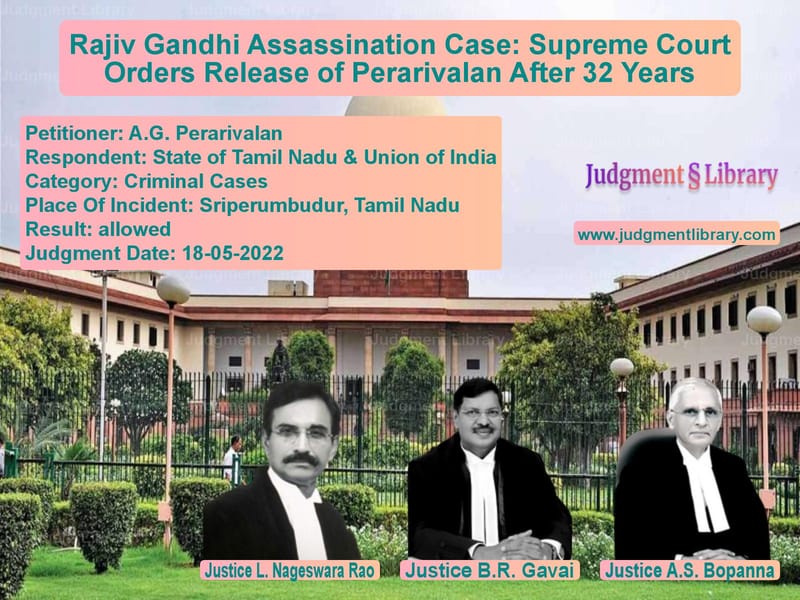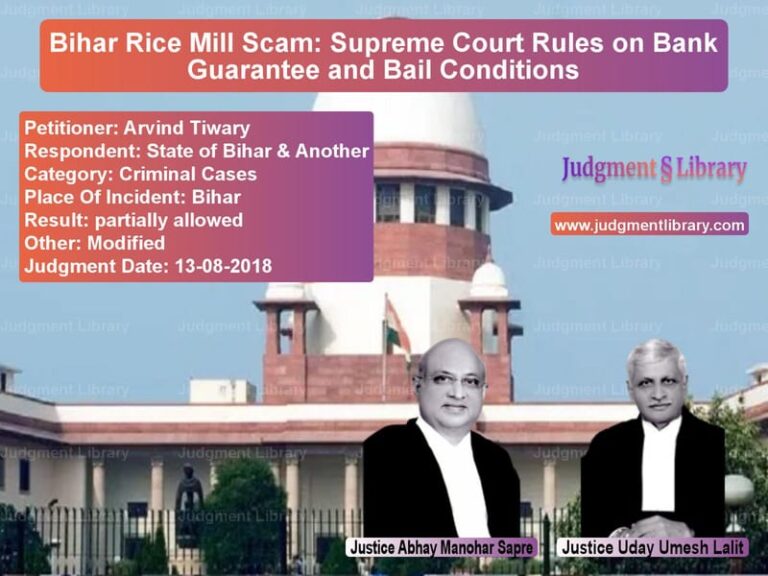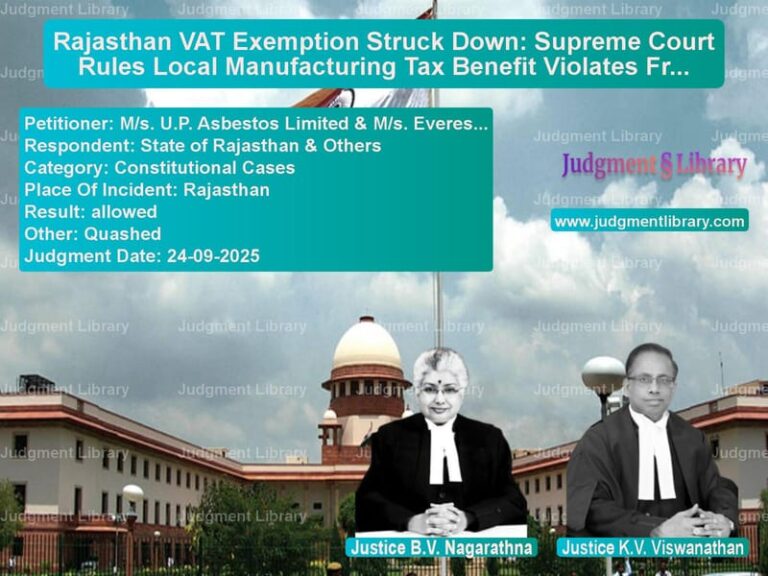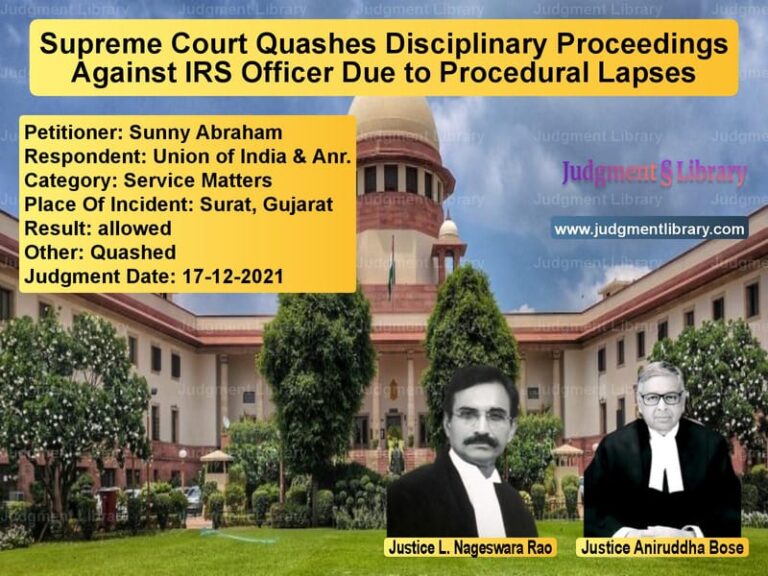Rajiv Gandhi Assassination Case: Supreme Court Orders Release of Perarivalan After 32 Years
The case of A.G. Perarivalan vs. State of Tamil Nadu marked a significant moment in Indian legal history. The Supreme Court ordered the release of A.G. Perarivalan, one of the convicts in the assassination of former Prime Minister Rajiv Gandhi, by invoking its extraordinary powers under Article 142 of the Constitution.
Background of the Case
Perarivalan was convicted for his role in the assassination of Rajiv Gandhi on May 21, 1991, at Sriperumbudur, Tamil Nadu. He was accused of procuring batteries used in the bomb that killed the former Prime Minister. In 1999, the Supreme Court upheld his death sentence, which was later commuted to life imprisonment in 2014 due to an inordinate delay in deciding his mercy petition.
For several years, Perarivalan sought remission of his sentence. In 2018, the Tamil Nadu government recommended his release under Article 161 of the Constitution. However, the Governor of Tamil Nadu delayed acting on this recommendation and instead referred the matter to the President of India in 2021.
Key Legal Issues
- Whether the Governor of Tamil Nadu had the authority to refer the State Cabinet’s remission recommendation to the President of India.
- Whether the delay in deciding Perarivalan’s remission violated his fundamental rights.
- Whether the Supreme Court could exercise its powers under Article 142 to grant him relief.
Arguments Presented
Petitioner’s Arguments (A.G. Perarivalan)
- The Tamil Nadu government’s recommendation for remission under Article 161 was binding on the Governor.
- The Governor had no constitutional authority to refer the recommendation to the President.
- Perarivalan had already served 32 years in prison, including 16 years on death row and 29 years in solitary confinement, causing undue hardship.
- His conduct in prison was exemplary, and he had earned educational qualifications, including a postgraduate degree.
- His case was similar to other convicts released under remission provisions.
Respondents’ Arguments (State of Tamil Nadu & Union of India)
- The Union government argued that only the President had the authority to decide remission in cases investigated by the Central Bureau of Investigation (CBI).
- The Governor had acted correctly in referring the remission recommendation to the President.
- Given the gravity of the crime, granting remission would set a dangerous precedent.
- The case involved national security concerns, and a decision on remission should be made at the highest level.
Supreme Court’s Observations
The Supreme Court strongly criticized the delay in deciding Perarivalan’s remission and ruled that the Governor’s referral of the case to the President was unconstitutional. The key observations included:
- The Governor was bound by the Tamil Nadu Cabinet’s recommendation: The Court held that under Article 161, the Governor must act on the advice of the State Cabinet.
- The delay in deciding remission was unjustified: The Governor sat on the recommendation for over two years, which was deemed arbitrary and illegal.
- The Union government’s argument was flawed: The Court rejected the claim that only the President could decide remission in CBI cases.
- Perarivalan’s prolonged incarceration was inhumane: The Court noted that he had served a disproportionate amount of time in prison.
- Article 142 was invoked to ensure justice: The Court used its extraordinary powers to grant him relief, given the failure of the executive to act.
Key Excerpts from the Judgment
The Supreme Court ruled:
“The advice of the State Cabinet is binding on the Governor in the exercise of his powers under Article 161 of the Constitution.”
The Court further observed:
“The reference of the recommendation of the Tamil Nadu Cabinet by the Governor to the President of India is without constitutional backing and is inimical to the scheme of our Constitution.”
Final Verdict
The Supreme Court invoked Article 142 to grant Perarivalan relief. The key conclusions were:
- The Tamil Nadu Cabinet’s recommendation for remission was valid and should have been implemented.
- The Governor’s referral of the matter to the President was unconstitutional.
- Given his 32 years of incarceration, the Court deemed that Perarivalan had served his sentence.
- Perarivalan was ordered to be released immediately, and his bail bonds were canceled.
Outcome: This landmark judgment reinforces the autonomy of state governments in remission cases and upholds the constitutional principle that Governors must act on the advice of the State Cabinet.
Petitioner Name: A.G. Perarivalan.Respondent Name: State of Tamil Nadu & Union of India.Judgment By: Justice L. Nageswara Rao, Justice B.R. Gavai, Justice A.S. Bopanna.Place Of Incident: Sriperumbudur, Tamil Nadu.Judgment Date: 18-05-2022.
Don’t miss out on the full details! Download the complete judgment in PDF format below and gain valuable insights instantly!
Download Judgment: a.g.-perarivalan-vs-state-of-tamil-nadu-supreme-court-of-india-judgment-dated-18-05-2022.pdf
Directly Download Judgment: Directly download this Judgment
See all petitions in Bail and Anticipatory Bail
See all petitions in Custodial Deaths and Police Misconduct
See all petitions in Judgment by L. Nageswara Rao
See all petitions in Judgment by B R Gavai
See all petitions in Judgment by A. S. Bopanna
See all petitions in allowed
See all petitions in supreme court of India judgments May 2022
See all petitions in 2022 judgments
See all posts in Criminal Cases Category
See all allowed petitions in Criminal Cases Category
See all Dismissed petitions in Criminal Cases Category
See all partially allowed petitions in Criminal Cases Category







